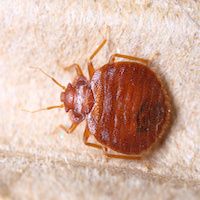Bed Bugs Able to Transmit Chagas Disease
A study published in the American Journal of Tropical Medicine and Hygiene found the common bed bug could transmit Trypanosoma cruzi (T. cruzi), a parasite, which causes Chagas disease.

A study published in the American Journal of Tropical Medicine and Hygiene found the common bed bug could transmit Trypanosoma cruzi (T. cruzi), a parasite, which causes Chagas disease.
Common to Latin American countries, Chagas disease affects 6 to 8 million people worldwide and is associated with 50,000 mortalities annually. The condition is difficult to diagnose in its infancy due to the lack of noticeable symptoms. Hiding in their host heart, the T. cruzi parasite, caused sudden death or heart failure years later through the progressive destruction of the heart muscle, a University of Pennsylvania release mentioned.
Triatomine bugs — a bloodsucking agent related to bed bugs – are known to transmit the disease-causing parasite not through their bites, but through feces left near their hosts’ faces, the statement also claimed.
However, for the first time, investigators at the University of Pennsylvania’s Perelman School of Medicine and Universidad Peruana Cayetano Heredia in Peru showed 2-way transmission of T. cruzi between bed bugs (Cimex lectularius) and their hosts.
The researchers uncovered several methods of infection between bed bugs and mice. A majority of uncompromised mice were infected after being exposed to T. cruzi-carrying bed bugs and some were infected after bed bugs’ feces came in contact with broken skin. Furthermore, investigators showed bed bugs acquired the parasite by feeding on the already infected mice.
“Mice can hunt and eat bed bugs,” said Ricardo Castillo-Neyra, DVM, PhD, the study’s co-author and postdoctoral fellow at the Universidad Peruana Cayetano Heredia and Penn. “The older studies were almost certainly only documenting oral transmission of the parasite. Our work shows for the first time that bed bugs can transmit the parasite when their feces are in contact with broken skin, the route by which humans are usually infected.”
Senior author Michael Z. Levy, PhD, an assistant professor of Biostatistics and Epidemiology at the University of Pennsylvania’s Perelman School of Medicine, claimed their discovery echoed assertions made by Carlos Chagas who implicated triatomine insects’ role in the disease before he looked at a single case. Based on their discovery, Levy recommended testing bugs for T. cruzi.
“We’ve shown that the bed bug can acquire and transmit the parasite. Our next step is to determine whether they are, or will become, an important player in the epidemiology of Chagas disease,” Levy said. “There are some reasons to worry — bed bugs have more frequent contact with people than kissing bugs, and there are more of them in infested houses, giving them ample opportunity to transmit the parasite. But perhaps there is something important we don’t yet understand about them that mitigates the threat.”